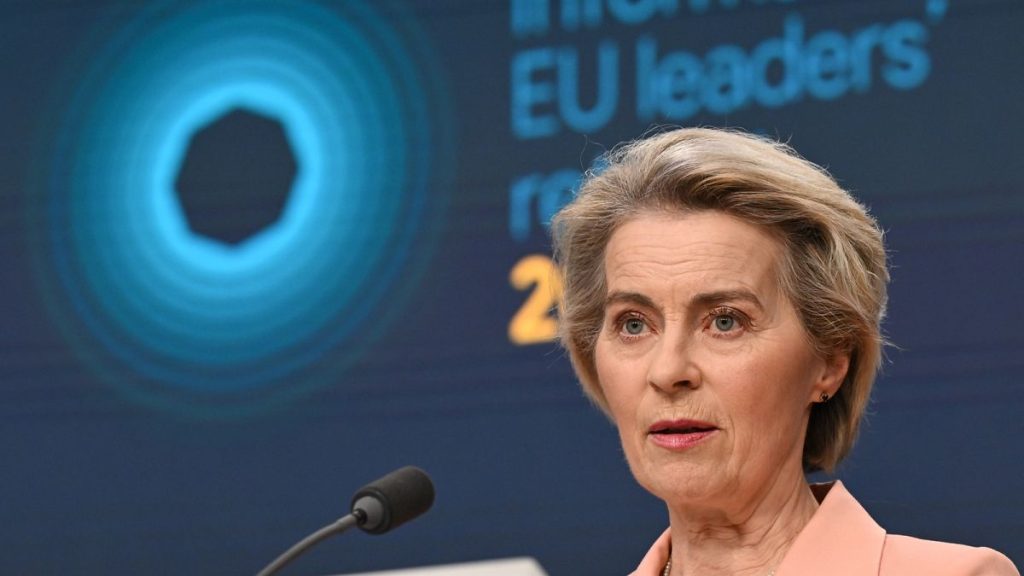The European Union finds itself at a crossroads in its trade relationship with the United States, facing the looming threat of tariffs imposed by the Trump administration. European Commission President Ursula von der Leyen has adopted a dual approach, emphasizing the EU’s willingness to engage in constructive dialogue while simultaneously asserting its readiness to defend its interests robustly. The recent temporary reprieve granted to Canada and Mexico from tariffs, following their concessions on border security and other issues, highlights Trump’s tactical use of tariffs as leverage in foreign policy negotiations. This approach raises concerns for the EU, suggesting that trade disputes may be driven more by political maneuvering than by genuine attempts to address trade imbalances. Von der Leyen has stressed the significant economic interdependence between the EU and the US, highlighting the potential for job losses and economic disruption on both sides of the Atlantic if a trade war erupts. Her message underscores the need for a pragmatic, solutions-oriented approach to negotiations, emphasizing the mutual benefits of a strong transatlantic partnership.
The backdrop to these trade tensions is a complex interplay of economic and political factors. Trump’s focus on the EU’s trade surplus in goods, while disregarding the EU’s surplus in services, reveals a selective interpretation of trade data. His rhetoric often emphasizes protecting American industries and jobs, echoing the nationalistic sentiments that characterized his presidential campaign. While the EU acknowledges the need to address trade imbalances, it also emphasizes the crucial role of services trade, where the US benefits, and the intertwined nature of EU-US economic ties. The EU’s strategy revolves around finding common ground with the US on issues of mutual interest, such as critical supply chains and emerging technologies, while remaining prepared to retaliate if tariffs are imposed. Von der Leyen has alluded to the potential for targeted counter-tariffs, similar to those Canada had prepared before reaching a temporary agreement with the US.
The EU’s approach to trade negotiations with the US reflects a broader shift in its foreign policy stance, adapting to the changing global landscape. The rise of “hyper-competitive and hyper-transactional geopolitics,” characterized by increasing authoritarianism, trade disputes, and disruptive technologies, requires the EU to be more assertive and agile in its international dealings. Von der Leyen has encouraged a pragmatic and calculated approach, prioritizing the EU’s own interests and moving beyond nostalgic attachments to past global orders. This strategic recalibration involves diversifying partnerships and engaging with countries like China, even amidst existing friction points, to expand trade and investment opportunities.
The potential trade war with the US serves as a microcosm of the broader challenges facing the EU in the 21st century. Von der Leyen’s emphasis on “level-headedness” in navigating these turbulent times reflects the EU’s commitment to finding stable and secure solutions that benefit its citizens. This approach necessitates a nuanced understanding of global power dynamics and a willingness to engage with a range of actors, even those with differing ideologies. The EU’s response to the US trade threats highlights its commitment to multilateralism and its determination to defend its economic interests while seeking mutually beneficial solutions.
The underlying tension in this situation lies in the contrasting approaches to trade and international relations. The US, under the Trump administration, has adopted a more transactional and protectionist stance, prioritizing national interests and using tariffs as a bargaining chip. The EU, on the other hand, continues to champion multilateralism and a rules-based international order, emphasizing the importance of cooperation and dialogue. This fundamental difference in perspective poses a significant challenge to finding a mutually agreeable resolution to the trade dispute. The EU’s strategy involves balancing its commitment to free and fair trade with the need to protect its own industries and jobs.
The ongoing trade dispute between the EU and the US highlights the complexities of international economic relations in an increasingly interconnected world. The outcome of these negotiations will have significant implications for both sides, shaping the future of transatlantic trade and influencing the broader global trade landscape. The EU’s approach, emphasizing dialogue, pragmatism, and the defense of its own interests, reflects a nuanced understanding of the challenges and opportunities presented by the evolving global order. The ability to navigate these complexities effectively will be crucial for the EU’s continued economic prosperity and its role as a key player on the world stage.














